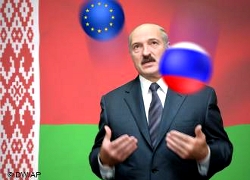European Union and Russia save Lukashenka’s regime from default
29- 16.11.2012, 12:36

Belarus would not have managed the 2011 crisis if it was for the trade with the EU and Russian loans.
Yesterday a plenary session of the advisory council on foreign investments for Belarus’ government took place. In its course the Prime Minister Mikhail Miasnikovich admitted that in the conditions of the last year’s economic crisis Belarus in fact was at the verge of default. According to the Prime Minister, tough administrative and restrictive measures saved the country from defaulting.
A co-chairman of the Belarusian Christian Democracy party Vitali Rymasheuski does not agree that the economy was saved by such measures. According to him, they on the contrary put the economic situation in the country in even worse degradation. In an interview to the charter97.org web-site the politician said that the European Union was the real savior of Belarusian economy:
“When an official at such a high level says about a default, which could have happened to Belarusian economy, it means that the threat of default was really there and it was quite serious, considering that Belarusian officials were in fact forbidden to talk about that. What helped to save the economy were not tough administrative and restrictive measures, they on the contrary put Belarusian economy into a deeper degradation and stagnation, but exactly European Union’s support. Namely, the dividends that Belarusian economy received from the trade with the European Union, from Russia’s support and from the fraud with grey export schemes for solvents, thinners and other products. That is why we can say the Belarus was saved by the European Union from default. It was the main consumer of Belarusian products, especially the contraband”, - Vitali Rymasheuski said.
Belarusian economist Barys Zhaliba agrees with the politician.
“Largely the loans from the anti-crisis foundation of the Eurasian bank of development saved the situation. If it wasn’t for that loan, than the failure of Belarusian economy in terms of inflation and devaluation would have been way deeper”, - Barys Zhaliba told the charter97.org web-site.
According to the expert, the European Union is the main customer for our oil products, which are the main export article for Belarus:
“The European Union automatically played a positive role. Belarus normally used to have positive trade balance with the EU. It remained positive. And it is clear that the European Union is the main customer for our oil products, which make the main article of our export. And of course, if it wasn’t for this export, which the European Union maintained, we would have been in misery”.
The increase of the import duties on cars contributed to the flow of foreign currency out of the country, the economist noted:
“We should not ignore the negative factor as well – which is the increase of the duties on imported cars up to the level of the ones in Russia. This led to the outflow of foreign currency to the European markets for car purchases, and it was not a single billion dollars”.
We would remind that in 2011 a major financial crisis broke out in Belarus, which was caused by unfounded salary increase before presidential elections in 2010. In the aftermath of the crisis the exchange rate of Belarusian ruble against US dollar dropped from 3000 to 8500, the devaluation accounted for 189% and the inflation was 108%.
The prices on food grew 125% in average, 105% - on passenger traffic. By November the rates for consumer loans reached 120%. At the same time the salary as calculated in dollars dropped from 500 to 170-220 (considering the impossibility to freely and legally buy USDs). The level of income dropped to the level of 2005.
The Minsk city executive committee cancelled the practice of issuing discounted loans for building accommodation and Lukashenka demanded to stop the outflow of people leaving the country to earn abroad. For 2011 the number of loan defaulters increased 2.5 times and the deposits of Belarusians in rubles devaluated for a billion dollars.
Despite the currency devaluation and introduction of anti-crisis economy management, the crisis did not stop and the inflation increased the forecasted level multiply. Most independent experts think that without carrying out structural reforms the situation will keep deteriorating. At the same time a number of high rank officials deny the existence of any crisis merely admitting some problems.










